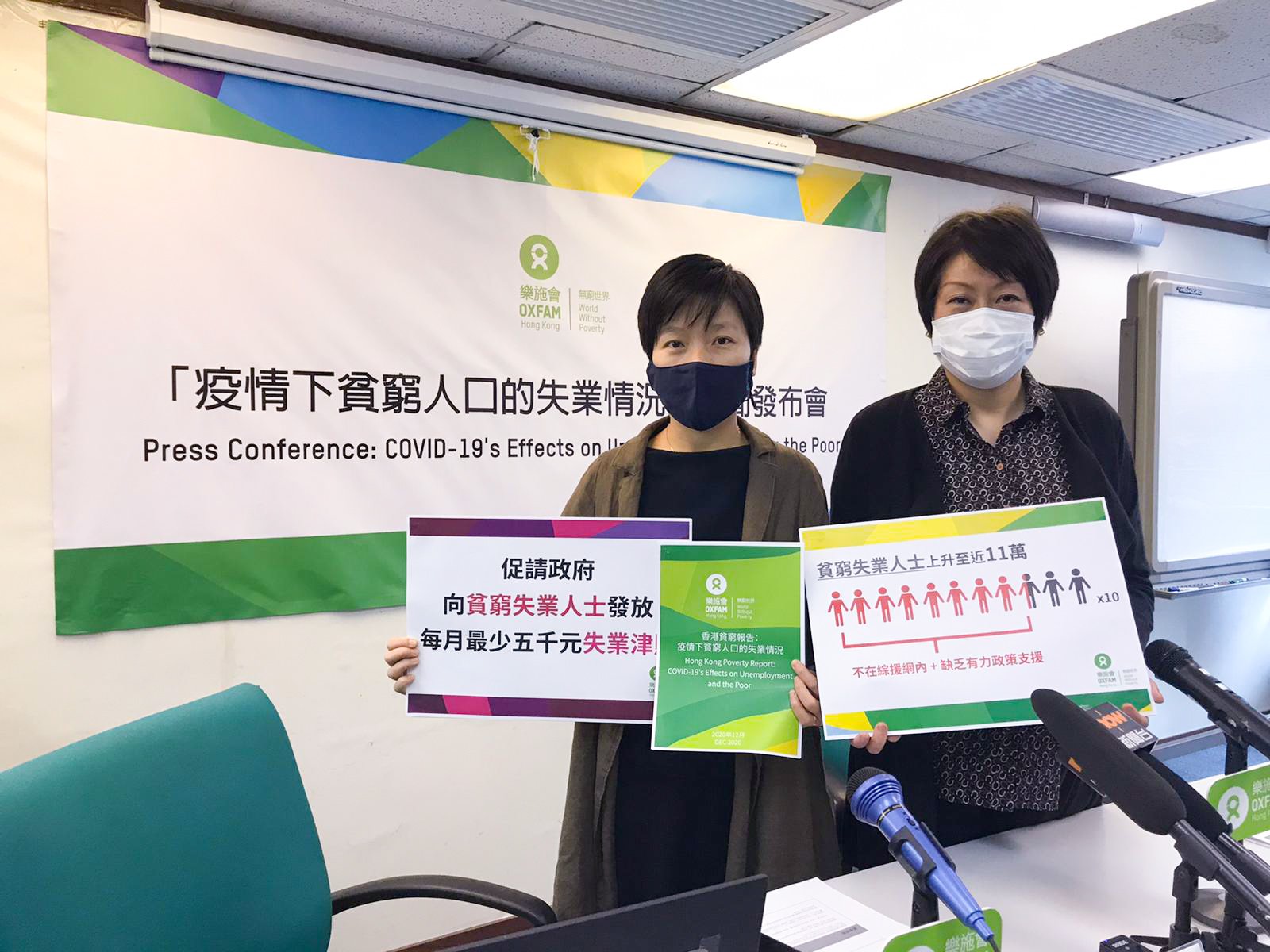08 DEC 2020
Number of poor and unemployed skyrockets to 110,000 – 1.6 times more than Q2 last year, but CSSA not reaching most
With the continued effects of COVID-19, the unemployment rate has reached 6.4% – the highest in 15 years – and 257,000 people are now out of work. Oxfam Hong Kong’s (OHK’s) latest research reveals that the number of unemployed people from poor households this year soared to nearly 110,000, 75% of which could be outside the safety net of Comprehensive Social Security Assistance (CSSA) scheme.
OHK studied Q2 data in 2019 and 2020 from the Census and Statistics Department’s General Household Survey, and analysed the number of unemployed people from poor households (i.e. those whose monthly income is lower than 50% of the median household income in Hong Kong). Given the government’s lack of measures to address unemployment in its latest Policy Address, the situation is expected to only worsen during the fourth wave of the pandemic. OHK thus urges the government to proactively implement policies to help poor individuals who are unemployed.
Kalina Tsang, Director General of OHK, said: ‘The CSSA is virtually the government’s only lifeline for the unemployed right now, but it isn’t meeting society’s needs. Given the fourth wave of COVID-19, unemployment will only grow increasingly severe as the government lacks measures to assist the poor who are unemployed.’
OHK is calling on the government to offer the poor and unemployed a short-term, monthly unemployment allowance not less than HK$5,000 for at least six months through the Community Care Fund. Doing this would benefit an estimated 80,000 people and would require roughly HK$2.4 billion.
According to OHK’s analysis, only a quarter of those who were poor and unemployed received unemployment assistance; the remaining three-quarters did not receive support through the CSSA. With the lack of government support, the fourth wave of COVID-19 will leave this group particularly vulnerable. OHK added that 67,400 more people are now poor and unemployed – 1.6 times more than Q2 of last year.
Unemployed people from poor households accounted for 45.5% of the total number of the unemployed population – an 8.8% increase from 36.7% in the same period in 2019. Further, more than half (57,300 people) have been unemployed for over three months, and more than 20% for over half a year.
Middle-aged and elderly individuals from poor households were hardest hit, with the number of unemployed people between the ages of 45 and 59 accounting for nearly 40% of the unemployed population. The largest increase, however, was seen among young people ages 25 to 29 where unemployment was 2.4 times higher than the same period in 2019. Also hard hit was the 50-to-54-year-old demographic. The statistics clearly show that unemployment is problem that is now affecting both the older and younger population.
In terms of industry, the retail, accommodation and food services sectors were hardest hit, with up to 29,700 people who had lost their jobs – double the number compared to Q2 of last year. The public administration, social and personal services sectors (which include education, entertainment and sports) also saw a marked increase; compared to the same period last year, the number tripled to over 10,000.
To help unemployed persons switch careers, OHK is urging the government to broaden the kinds of courses that are supported through the Love Upgrading Special Scheme 2. It also recommends including 25-to-29-year-olds in the scope of the Youth Employment and Training Programme to address unemployment among poor youths. This would also give employers greater incentive to hire young people during the pandemic.
Further, OHK believes some workers who earn slightly more than the minimum wage now will have their salaries reduced to minimum wage during the pandemic. The organisation is thus opposed to the minimum wage freeze, and urges the Chief Executive and Executive Council to raise the minimum wage to at least HK$41.4 to ensure that workers can support one other person and earn more than what they would receive through social assistance. Minimum wage should also be reviewed every year so that it increases with inflation and ensures workers can achieve a basic standard of living.
- Ends -
Report (Chi only): Hong Kong Poverty Report: Unemployment among the poor during COVID-19
About Oxfam
Oxfam is a worldwide development organisation that mobilises the power of people against poverty.
For media enquiries:
Samantha Wong | Roni Chan |
Ms. Kalina Tsang, Director General (right), and Ms. Wong Shek Hung, Acting Director of Hong Kong, Macau, Taiwan Programme (left), announced findings from Oxfam's latest report. Oxfam found that the number of poor and unemployed people had skyrocketed to 110,000 – 1.6 times more than Q2 last year, but the CSSA is not reaching most.

